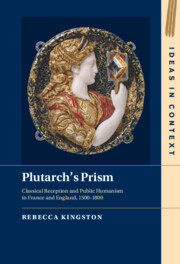Book contents
- Plutarch’s Prism
- Ideas in Context
- Plutarch’s Prism
- Copyright page
- Contents
- Figures
- Preface
- Acknowledgements
- Introduction
- Part I Setting the Stage
- Part II Plutarch in Renaissance France and England
- Part III Seventeenth- and Eighteenth-Century Plutarch
- Chapter 8 Shedding New Light on Thomas Hobbes’s Leviathan (1651)
- Chapter 9 Plutarch on Stage: Shakespeare, Pierre Corneille and Jean Racine
- Chapter 10 Plutarch in the Long Eighteenth Century with a Focus on British and Irish Political Thought
- Chapter 11 Plutarch in French Enlightenment Thought: The Abbé de Saint-Pierre, the Abbé Mably and Jean-Jacques Rousseau
- Conclusion
- Bibliography
- Index
Chapter 11 - Plutarch in French Enlightenment Thought: The Abbé de Saint-Pierre, the Abbé Mably and Jean-Jacques Rousseau
from Part III - Seventeenth- and Eighteenth-Century Plutarch
Published online by Cambridge University Press: 22 September 2022
- Plutarch’s Prism
- Ideas in Context
- Plutarch’s Prism
- Copyright page
- Contents
- Figures
- Preface
- Acknowledgements
- Introduction
- Part I Setting the Stage
- Part II Plutarch in Renaissance France and England
- Part III Seventeenth- and Eighteenth-Century Plutarch
- Chapter 8 Shedding New Light on Thomas Hobbes’s Leviathan (1651)
- Chapter 9 Plutarch on Stage: Shakespeare, Pierre Corneille and Jean Racine
- Chapter 10 Plutarch in the Long Eighteenth Century with a Focus on British and Irish Political Thought
- Chapter 11 Plutarch in French Enlightenment Thought: The Abbé de Saint-Pierre, the Abbé Mably and Jean-Jacques Rousseau
- Conclusion
- Bibliography
- Index
Summary
Chapter 11 explores Plutarch reception in political reflection through the work of the Abbé de Saint-Pierre (1658–1743), the Abbé Mably (1709–1785) and Jean-Jacques Rousseau (1712–1778). Rousseau is the culminating figure in my study, and Plutarch’s place in Rousseau’s political reflection is a highly complicated one. It could be suggested that Rousseau’s broader intellectual project was developed on the pillars derived from fundamental Plutarchan tenets of moral education in virtue, exemplarity as a central aspect of moral thinking, and political right as the pursuit of justice and the common good. In a concluding section to the chapter I demonstrate, partly in dialogue with contemporary scholarship on Rousseau in political theory, how Rousseau’s political vision as developed in the Social Contract can be regarded as a turning away from the ideas of public humanism with which Plutarch’s work was associated in the period covered by my overall analysis in this book.
Keywords
- Type
- Chapter
- Information
- Plutarch's PrismClassical Reception and Public Humanism in France and England, 1500–1800, pp. 367 - 409Publisher: Cambridge University PressPrint publication year: 2022

